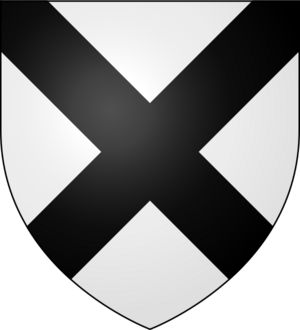William Coryton facts for kids
William Coryton (born 1580, died 1651) was an important gentleman from Cornwall, England. He served as a Member of Parliament (MP) for several areas in Cornwall during the 1600s. An MP is a person elected to represent their local area in the country's main law-making body, the Parliament. William Coryton was an MP for Cornwall in 1624, 1626, and 1628. He also represented Liskeard in 1625, Grampound in 1640, and Launceston from 1640 to 1641. He was later removed from Parliament because of problems with how some election results were handled.
Contents
Who Was William Coryton's Family?
William Coryton was the oldest son of Peter Coryton. His family lived in a place called Coryton in Devon, and also at West Newton Ferrers in St Mellion, Cornwall. His mother was Joan Wrey. Her father was John Wrey, and her brother was Sir William Wrey. Both families were well-known in the region.
William Coryton's Political Journey
William Coryton had a long career in public service and politics. He held several important roles in Cornwall.
Early Roles and Parliament
In 1603, William Coryton became the Vice-Warden of the Stannaries. This was an important job overseeing the tin mines and the special courts related to them in Cornwall. Later, in 1613, he was appointed High Sheriff of Cornwall. This role was like the chief law enforcement officer for the county.
In 1624, he was first elected as a Member of Parliament for Cornwall. He then became an MP for Liskeard in 1625. He was elected again for Cornwall in 1626.
Facing Challenges in Parliament
In 1627, William Coryton faced a difficult situation. He was arrested because he refused to pay a special tax that the King demanded. He was held in a prison called the Fleet Prison until March 1628. During this time, his job as Vice-Warden of the Stannaries was given to someone else.
However, he was released just before Parliament was set to meet in 1628. He was then re-elected as an MP for Cornwall. He spoke in important discussions about religious issues and taxes. People described his speeches as "moderate," meaning he tried to be fair and reasonable.
The Parliament Incident of 1629
A famous event happened in Parliament on March 2, 1629. William Coryton was present when the Speaker of the House of Commons, Sir John Finch, was held in his seat by other MPs. This happened because the Speaker tried to end the meeting before certain issues could be discussed and voted on.
After this event, William Coryton was accused of helping the other MPs. He was called to appear before a special court called the Star Chamber. He refused to answer the charges, saying that MPs had special rights. Because of this, he was sent to the Tower of London as a prisoner. He was eventually released after he agreed to cooperate. He was also given his job back in the Stannary Courts.
Later Career and Removal from Office
Later, in 1640, William Coryton was elected as an MP for Grampound. He was re-elected for Grampound in November 1640 for the Long Parliament. At this time, he was also the Mayor of Bossiney.
However, he was found to have made mistakes in how the election results were handled for the Bossiney area. He was also found to have managed the Stannary Courts poorly. Because of these issues, he was not allowed to keep his seat in Parliament. He also lost his other important jobs, including Vice-Warden of the Stannaries and Deputy-Lieutenant of Cornwall.
William Coryton's Family Life
William Coryton married Elizabeth Chichester. She was the third daughter of Sir John Chichester, who was the Sheriff of Devon in 1585. William and Elizabeth had a large family with four sons and seven daughters.
Their eldest son was Sir John Coryton (1621–1680). He later became a Baronet, which is a special title of honor.
When Did William Coryton Die?
William Coryton passed away on May 1, 1651. He was buried in the church of St Mellion, which is near Plymouth. A sculptor named Thomas Gaffin created a tomb for him much later, in 1836.
On his tomb, there is a short poem that describes him:
Both good and great, and yet beloved;
In judgment just, in trusts approved.
This poem suggests that he was seen as a good and important person who was fair and trustworthy.
Images for kids
 | Chris Smalls |
 | Fred Hampton |
 | Ralph Abernathy |



